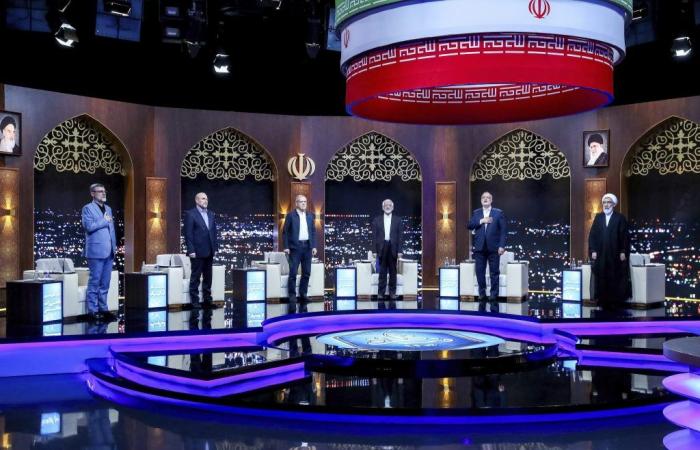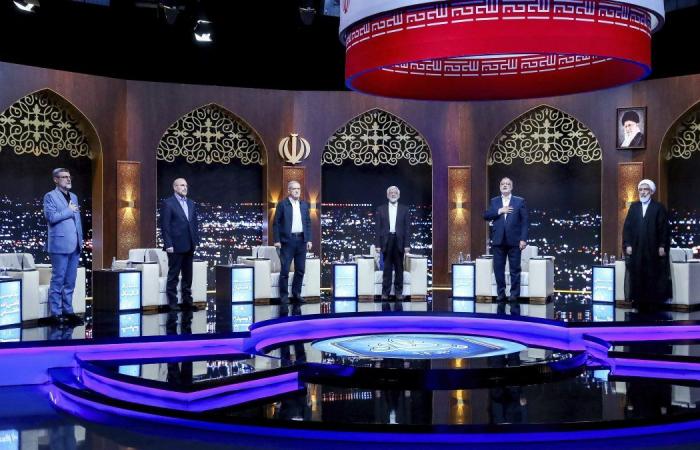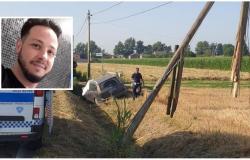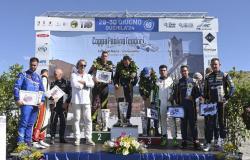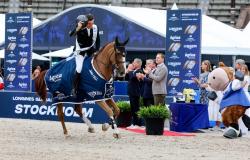Friday, June 28, 2024 61 million Iranians are called to the polls to elect the new president, in a country where 60% of the population is under 30 years old. If no candidate reaches 50% plus one of the votes in the first round, a run-off will take place on the first Friday after the results are announced.
The vote was brought forward to June 28, compared to the natural expiry of the presidential mandate of four years in 2025, due to the sudden death in a plane crash last May 19 in eastern Azerbaijan of former president Ebrahim Raisi, the foreign minister , Hossein Amir-Abdollahian, along with seven other people.
First obstacle: the low turnout at the polls
Iran’s June 28 presidential election will be a test bench to test the internal divisions within the ayatollahs’ regime. The emotional wave that drove thousands of Iranians to fill the streets of Tabriz, Tehran and Mashhad during the massive funeral of former President Raisi could galvanize pro-regime voters and push them to go to the polls in large numbers.
Read more from this author
A voter turnout below 50% would make the June elections very weak in the eyes of Iranians. Already in the parliamentary elections of March 1st, which saw a landslide victory for the conservatives, only 41% of those eligible to vote went to vote.
How the candidates were chosen and who was excluded
The vote was preceded by the usual vote preventive cancellation of any candidate considered anti-regime by the Guardian Council. The twelve ayatollahs who are part of it have not only eliminated any candidate inconvenient for the Islamic Republic but also politicians with their own following of votes who could challenge the post-Khomeini institutional structure.
74 out of 80 potential presidential candidates were eliminated by the Council. Among them, the names of the former vice-presidents, Eshaq Jahangiri, and the reformist, Abbas Akhondi, stand out. Both asked to appeal but were not granted. The same fate befell the former president, the ultra-conservative Mahmud Ahmadinejad. Excluded from the 2024 presidential elections, he had already been canceled by the Council in previous elections.
Not only that, the speaker of parliament, Ali Larijani, was unable to take part in the election campaign. This had already happened in 2021 under the pretext of his daughter’s ties with the United States. Once again, no woman was admitted as a candidate to vote.
Mohammad Ghalibaf, the real favourite
Six candidates were admitted to the 2024 presidential elections by the Guardian Council: five conservatives and one reformist. In a political context of uncertainty about the election result, the main favorite to win the June 28 vote is Mohammad Bagher Ghalibaf62 years old, former mayor of Tehran and speaker of parliament.
Ghalibaf has been a long-time leader of the Revolutionary Guard Corps (IRGC), known for its violent repression of student movements in the country. Although his popularity has declined in recent years, he could also be a leading candidate to become the new Supreme Leader after Ali Khamenei.
This is the most important political position for the power structures in Iran, much more relevant for the internal decision-making dynamics of the President of the Republic. The other establishment candidate who could become the new Iranian president is Saeed Jalili, 58 years old, an ultra-conservative populist, who headed the Supreme National Security Council and is a member of the Discernment Council which deals with resolving disputes between the Council of the guardians and parliament.
Jalili opposed the negotiations that led to the nuclear agreement in 2015 between Iran and the P5+1, the countries of the UN Security Council and Germany. The politician also spoke out in favor of repressing the protest movements that have swept across the country in recent years with the use of violence.
The unknown Masoud Pezeshkian
Masoud Pezeshkian
If the majority of Iranians probably will boycott the vote of June, many disappointed people could be motivated to go to the polls to vote again for a reformist politician. The only one admitted from this political current by the Guardian Council is the doctor Masoud Pezeshkian.
A cardiovascular surgeon born in West Azerbaijan who served as a parliamentarian for 20 years, Pezeshkian, 69, became known across the country for raising his three children alone after a car accident that killed his wife. His admission to the vote was a surprise because in the elections that led to Raisi’s victory three years ago, no reformist candidates had been admitted.
The main figure of this political group is Mohammad Khatami, former president between 1997 and 2005, who had raised hopes among young people and the middle class for a change from within the decision-making mechanisms of the Islamic Republic. However, the continuous veto of the Guardian Council prevented him from obtaining substantial results. Masoud Pezeshkian, former Minister of Health during Khatami’s second term, has tried to reform health services in the countryside. And so his participation in the vote is seen by many Iranian dissidents as an attempt by the regime to motivate the most distrustful and anti-system electorate to go to the polls.
Who are the other candidates for the 2024 Iranian elections?
Mostafa Pourmohammadi
As has happened in the past, some candidates of less political importance they withdrew at the last moment from the competition to also channel their votes to the favored conservative candidates. Among them are Amirhossein Ghazizadeh Hashemi, former vice-president of Ebrahim Raisi, and head of the ultra-conservative Martyrs’ Foundation, and the mayor of Tehran Alireza Zakani. The radical politician has expressed himself in favor of protectionist economic measures and the revaluation of the local currency, the rial.
The ultra-conservative Mostafa Pourmohammadi, 64, served as interior minister under the radical Mahmoud Ahmadinejad. Like Raisi, Pourmohammadi played a central role in the executions of thousands of political opponents in 1988.
The electoral campaign
During his election campaign, Masoud Pezeshkian advocated a rapprochement with the United States and a review of the close relations between Tehran and Moscow, following the outbreak of the war in Ukraine. He also criticized the police’s use of violence to enforce the obligation to wear a headscarf.
Together with Mir Husein Mousavi and other reformist politicians, Pezeshkian criticized police repression of the “Woman, Life, Freedom!” movement. after the massive protests of 2022-2023, triggered by the killing of the young Kurdish Mahsa Amini by the morality police. Finally, Pezeshkian blamed the economic crisis in Iran on the country’s international isolation, pointing the finger at the decline in Chinese investments.
On the other hand, in the televised debates, the two main conservative candidates, Saeed Jalili and Mohammad Ghalibaf spoke out for a hard line towards the West and against new negotiations on the Iranian nuclear issue. Not only that, on various occasions, they have shown support for the repression with violence against women who do not respect the restrictive clothing rules, implemented in July 2023, after almost a year of demonstrations against the compulsory hejab.
Rouhani’s criticisms and new arrests
A very critical opinion towards the electoral procedures came from the moderate former president, Hassan Rouhaniin power between 2013 and 2021. The technocrat accused the Guardian Council of having hollowed out the democratic debate and reduced the role of voters by canceling candidates with positions critical of the Islamic Republic.
“I am not speaking out in defense of myself but of the republican and Islamic system, in defense of the institution of the President of the Republic which directly represents all Iranians and should not be weakened,” Rouhani argued. Rouhani was unable to take part in the vote for the election of the new members of the Foreign Assembly who will be called upon to choose Khamenei’s successor as supreme leader. One of Khamenei’s possible successors is his son Mojtaba.
As if that were not enough, confirming the repressive climate in which Iranians are called to go to the polls, after the thousands of arrests in recent years and at least 500 deaths in street demonstrations, two journalists were arrested and sentenced during the election campaign. Yashar Soltani was sentenced to 14 months and Saba Azarpeik to two years. Both had published investigations in which they discussed corruption charges against the favored candidate, Mohammad Ghalibaf.
The geopolitical dynamics
The June vote takes place in a very delicate phase for the Islamic Republic. The geopolitical context sees Iran and its network of allies in the Middle East, from Syria to Iraq, from Lebanon to Yemen, also playing a significant role in the ongoing war in Gaza.
Iran’s regional role has become increasingly important following the mutual attacks between Tel Aviv and Tehran last April. And so the victory of a radical politician in Iran could contribute to aggravating regional tensions and further extending the conflict between Israel and Hamas. Not only that, it could favor a large-scale bilateral treaty, which would already be ready, with Vladimir Putin’s Russia.
The presidential elections in Iran, convened hastily after Raisi’s deathand with a very short electoral campaign, could end without surprises. It will most likely be a clash between conservatives and ultraconservatives, between Mohammad Ghalibaf and Saeed Jalili, in which the data on electoral participation and voter turnout will weigh.
The only reformist candidate, Masoud Pezeshkian, will serve the regime mainly to motivate greater electoral participation while the majority of Iranians continue to be disillusioned by the restrictions imposed on personal and social freedoms, particularly of women and workers, in the oil-rich country.
Giuseppe Acconcia is a professional journalist and teacher. He teaches State and Society in North Africa and the Middle East at the University of Milan and Geopolitics of the Middle East at the University of Padua. PhD in Political Science at the University of London (Goldsmiths), he is the author, among others, of “Arab Notebook” (Bordeaux, 2022), “The Arab Spring” (Routledge, 2022), Migrations in the Mediterranean (FrancoAngeli, 2019) , The great Iran (Padova University Press, 2018).

